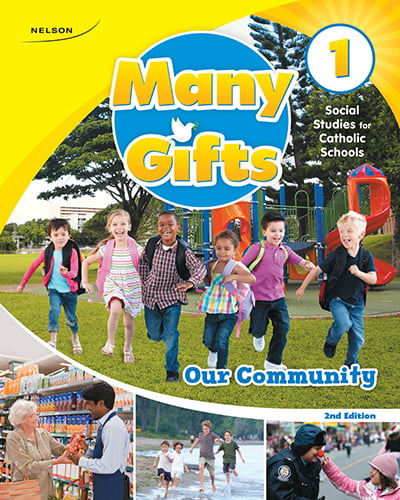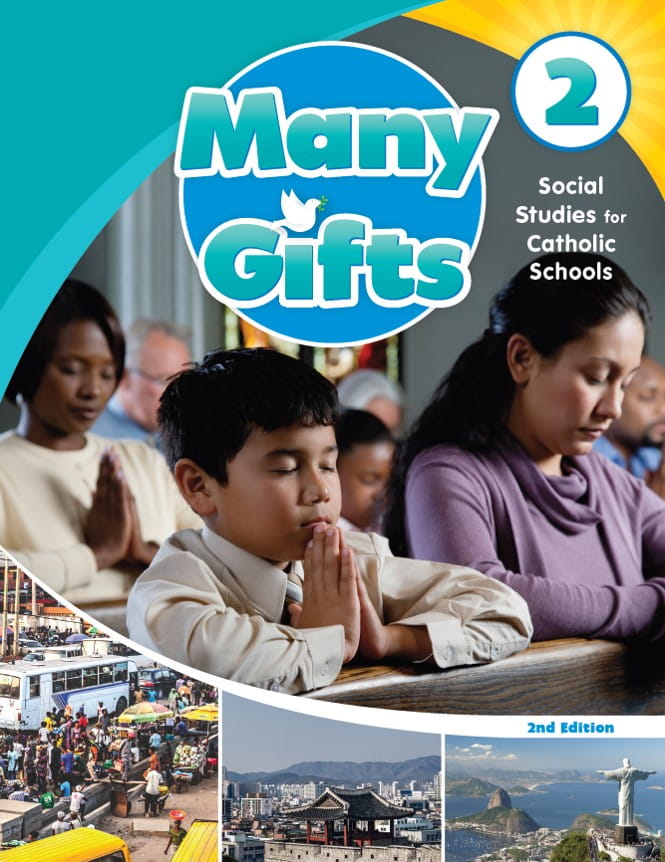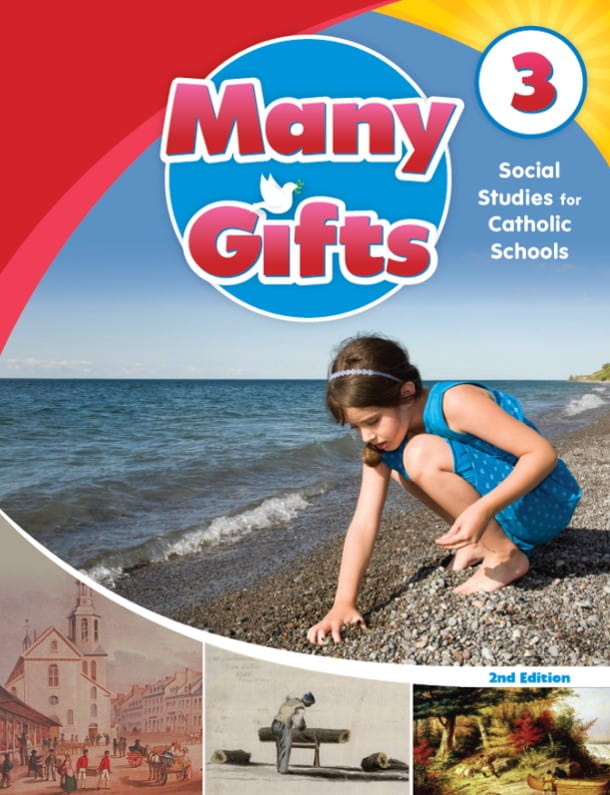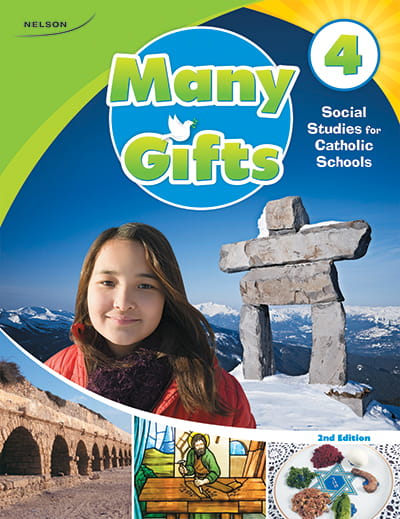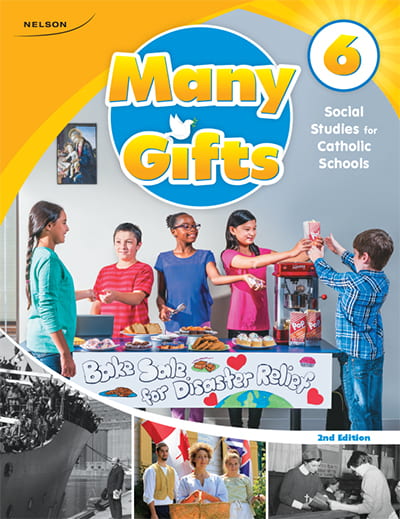
Many Gifts
Connecting 1–6 Ontario Social Studies with Catholic Teachings
Key Features

Custom Catholic Resource
The Ontario Catholic Graduate Expectations and Catholic Social Teachings are seamlessly infused throughout this series

Saves You Time
Aligned to the 2013 Ontario Social Studies Curriculum, this series focuses on inquiry, social studies thinking concepts, citizenship, and spatial skills in one comprehensive resource

Blended Print and Digital
Available in both print and digital formats to suit a range of classroom environments
Select Your Grade Below
Correlations
Listed below are links to detailed curriculum correlations, demonstrating Many Gifts alignment by grade to each of the following Ontario curricula:
- 2013 Ontario Social Studies Curriculum, Grades 1–6
- 2012 Ontario Catholic Elementary Religious Education Curriculum Policy Document, Grades 1–8
- 2012 Ontario Catholic Elementary Family Life Curriculum Policy Document, Grades 1–8

Grade 1
- Correlation to Ontario Social Studies Curriculum
- Correlation to Ontario Religious Education Curriculum
- Correlation to Ontario Family Life Education Curriculum
- Correlation of Start With Your Heart Levelled Little Books to Many Gifts Grade 1
Grade 2
- Correlation to Ontario Social Studies Curriculum
- Correlation to Ontario Religious Education Curriculum
- Correlation to Ontario Family Life Education Curriculum
Grade 3
- Correlation to Ontario Social Studies Curriculum
- Correlation to Ontario Religious Education Curriculum
- Correlation to Ontario Family Life Education Curriculum
Grade 4
- Correlation to Ontario Social Studies Curriculum
- Correlation to Ontario Religious Education Curriculum
- Correlation to Ontario Family Life Education Curriculum
Grade 5
- Correlation to Ontario Social Studies Curriculum
- Correlation to Ontario Religious Education Curriculum
- Correlation to Ontario Family Life Education Curriculum
Grade 6
Father Michael Ryan
It is important that students in the Catholic school be introduced to Catholic social teaching when they’re doing their social studies program. The reason for that is simply that Catholicism is not just a body of truth to be believed, but it’s a way of life to be lived.
When we talk about our faith as a way of life to be lived, we’re talking about what’s studied in world theology. One part of moral theology looks at our relationship to God, another part looks at our relationship to other people, and a third part looks at our relationship to social institutions. It’s that third part that we call “Catholic social teaching.” Applying Catholic social teaching to social studies in the Many Gifts program is a matter, of course, on the one hand of following the ministry guidelines, and on the other, looking at the demands of Catholic social teaching.
When we look at the ministry guidelines, one of the first things we realize is that they provide for citizenship education, and that’s very good because when the guidelines talk about citizenship education, they talk about involvement in the social institutions in our life, talk about leadership, and talk about the virtues that go along with that, such things as listening to other people and cooperating with people. And all of that’s wonderful, and all of that we certainly do incorporate into the Many Gifts program.
However, what we can do from the point of view of Catholic social teaching is that we can provide first of all, a reason for doing that. We can provide a motivation based on our faith. We can show why they should be involved in social institutions and why it’s important for them to take leadership roles; reasons based in our faith.
Ministry guidelines also call for training students in critical thinking, and that’s wonderful. We think that’s important that students be trained in critical thinking, so in Many Gifts, we provided our own model for developing the skills of critical thinking: a model of See, Reflect, and Act. And using that model as well as the text, we also use the occasion to introduce the students, then, to the virtues that involves: the cardinal virtues. Not only the virtue of good sense, but the virtue of justice, the virtue of self-discipline, and the virtue of courage.
To Catholic teachers I would say, remember that you have a great vocation, a great calling, and that calling is to help form the faith of those children in your care. Specifically with regard to the Many Gifts program, children should see in you the kinds of attitudes that reflect the social teaching of the church. They should see that those are your attitudes, too. The attitudes you’re trying to communicate to them are the attitudes that already form your own life.
Catholic faith and values, specifically Catholic social teaching, has been infused into the Many Gifts series in many ways, particularly by introducing students to basic truths in Catholic social teaching, like for example, what we mean by the dignity of the person. When we speak of the dignity of the person, we mean that the person’s goal or end makes them utterly different.
What makes humans or human persons different is that we can know, love, and serve God. No other animal on Earth can do that. Only we can do that. That makes us distinctive. That’s what we mean by dignity.
I’ve been honored to be part of the production of the Many Gifts program at this stage in the proceedings. I’ve helped the team to identify what particular social teaching should predominate in each lesson. I’ve helped them pick the appropriate Scripture texts. I’ve helped them with the See, Reflect, and Act model at each stage. I’ve produced the box that we have in many of the chapters, “Father Mike Explains.”
I’ve also tried to be helpful to the team in taking the social teachings of our church and putting them in a language that is understandable to young children.
Watch Father Michael Ryan explain the importance of virtues education and social justice teachings using Many Gifts
As Theological Advisor for the series, Father Michael Ryan guides learners through Catholic Teachings making them accessible for both students and teachers
